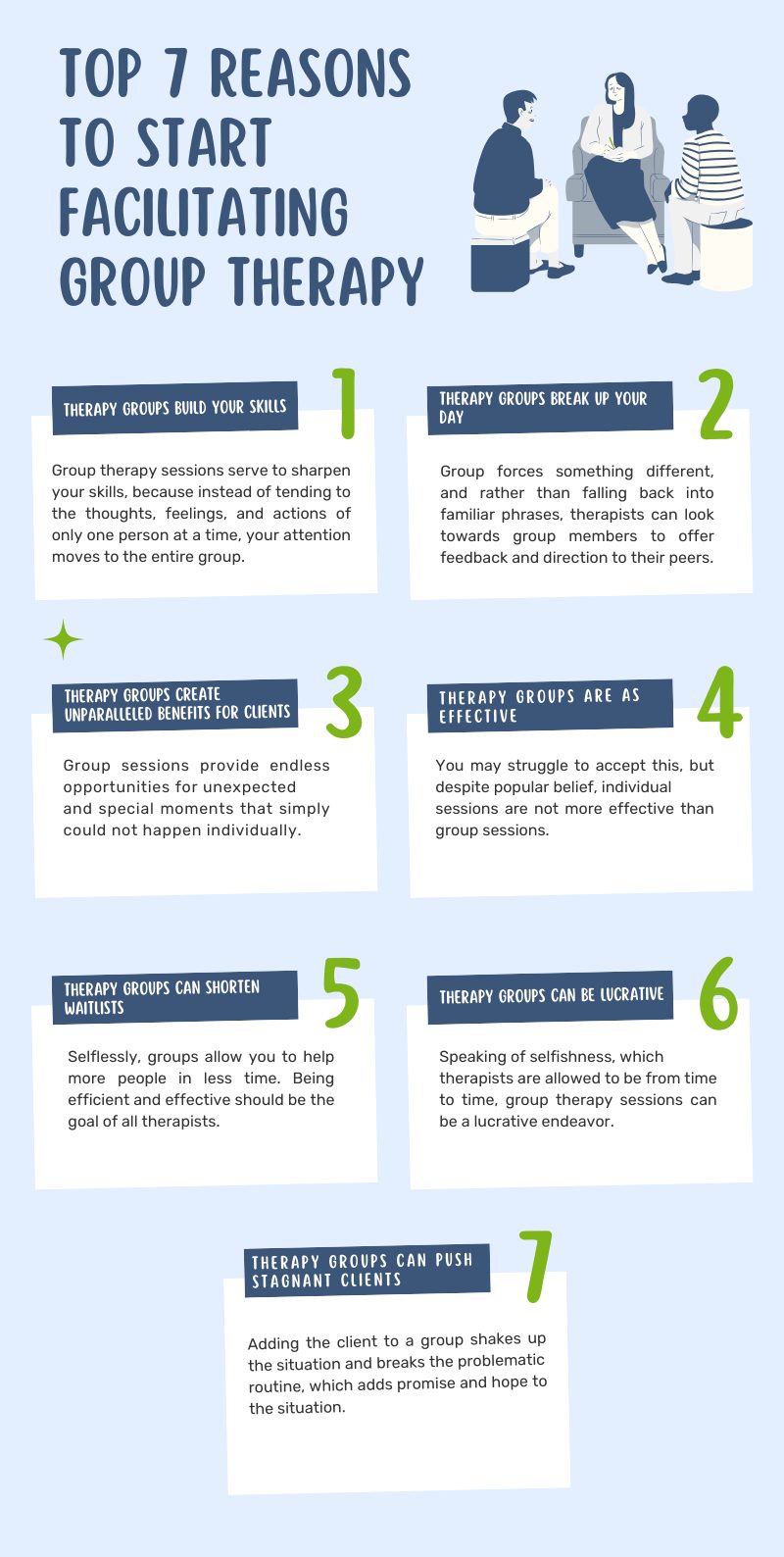
Becoming a Group Therapy Facilitator: Making the Leap to Therapy Groups
Maybe you’re a new therapist looking to expand their skill base as a group therapy facilitator, or maybe you’re a seasoned therapist hoping to avoid burnout. In either case, shifting your practice to include more group sessions could be a very positive experience. Facilitating group therapy sessions offers a significant change of pace from individual sessions, and adding just one or two therapy groups to your routine could boost your confidence, enjoyment, and satisfaction in your work.
Free Download: Group Therapy Starter Kit

Top 7 Reasons to Start Facilitating Group Therapy
Becoming a group therapy facilitator can seem like a major departure from your normal work, so before you start considering mental health group topics, populations to work with, or group formats, it’s best to affirm your desire to begin this process. By fully committing to group work, you’ll find yourself persistent and dedicated to the practice.
Are you thinking about facilitating group therapy sessions? Here’s some reasons you should:(1,2)
1. Therapy Groups build your skills. If you want to get good at being a therapist quickly, groups might be the answer. Group therapy sessions serve to sharpen your skills, because instead of tending to the thoughts, feelings, and actions of only one person at a time, your attention moves to the entire group. These experiences finely tune your therapeutic abilities and test your limits.
2. Therapy Groups break up your day. Many therapists find themselves in a tough pattern of saying the same things to different clients, session after session. Without a lot of variety, therapists increase their risk of burnout. Group forces something different, and rather than falling back into familiar phrases, therapists can look towards group members to offer feedback and direction to their peers. After the session, you can return to individual meetings with a fresh perspective and renewed energies.
3. Therapy Groups create unparalleled benefits for clients. For many clients, individual sessions are great ways to assess and treat their symptoms. For other clients, though, group therapy is the more powerful form of treatment. Group sessions provide endless opportunities for unexpected and special moments that simply could not happen individually. This group “magic” may seem hard to believe, but when you experience it, you’ll be convinced.
4. Therapy Groups are as effective as individual sessions. You may struggle to accept this, but despite popular belief, individual sessions are not more effective than group sessions. A person receiving group therapy can get all the same positive outcomes as someone in individual therapy, so there is no reason to think of group as an inferior form of treatment.

5. Therapy Groups can shorten waitlists. Selflessly, groups allow you to help more people in less time. Being efficient and effective should be the goal of all therapists. Selfishly, therapy groups can shorten your waitlist and help reduce the sense of stress and pressure that comes from turning people away from your practice. Instead of saying you're full, you can suggest a helpful group as an alternative.
6. Therapy Groups can be lucrative. Speaking of selfishness, which therapists are allowed to be from time to time, group therapy sessions can be a lucrative endeavor. Billing for eight or ten group therapy hours can return a pretty high rate compared to one individual session. There might be more planning and preparation time at first, but as sessions progress, that time will shrink dramatically.
7. Therapy Groups can push stagnant clients. Many therapists feel stressed, incompetent, and stuck when their client’s progress is plateauing. Sessions become repetitious as they lack direction as neither the client or the therapist know what to do next. Adding the client to a group shakes up the situation and breaks the problematic routine, which adds promise and hope to the situation.
Perhaps the best reason to start a therapy group is the reason why most therapists avoid the modality - they think they don't know how to facilitate a group therapy session. They think they are unprepared, unskilled, or even a danger to their clients.(3)
In actuality, therapists know more about therapy groups than they think. All of the skills refined in individual sessions apply to group sessions and help a person facilitate tremendous progress. Of course, chances are great that you are not going to change the face of group therapy for the better during your first session, but with a little practice and repetition, you could surprise yourself.
What You Need to Start Facilitating Group Therapy
Before you start a therapy group, it may be tempting to undertake a deep dive into all the theory and techniques utilized from the outset of the practice. Names like Yalom, Schilder, Wender, and Moreno may start swirling around your head, but this practice may be too much information obtained too quickly.
To really experience a group session, ask a trusted colleague to join or observe their group sessions for a time. If none are available, you could learn a lot by attending support groups in your area. These groups, of course, lack the professional direction of therapy groups, but they offer a glimpse into burgeoning group dynamics.
Immerse yourself in the setting, the flow, the experience, and the discomfort of group sessions. Though it may seem overwhelming or overstimulating at first, you’ll find yourself habituating to it like you would adjusting to the temperature of a hot tub. (4)
At the beginning of the process, your intuition will be the most valuable tool, so avoid the urge to overly structure or plan the sessions. Allowing the content, feelings, and interactions to develop organically is one of the best features of the group therapy process.
To balance the benefits of your intuition, seek out helpful supervision or clinical consultation for group therapy. Adding someone’s expertise can enhance your instincts and have you consider issues before they present in session.
Reasons to Avoid Group Therapy Facilitation
Devising, planning, and running group therapy sessions is a great option for many, but it may not be appropriate or realistic for you. In a small subset of therapists, group sessions are not advisable.
You should resist and avoid facilitating group therapy if:
- You cannot be consistent with session times
- You cannot find group members that complement each other
- You feel unsafe or you cannot maintain the safety of others
- You or the clients are too likely to be triggered during sessions
- You lack the physical space or the online tools to facilitate a meeting
Final Thoughts on Facilitating Group Therapy Sessions
Unless there are major setbacks or obstacles, you’re set to expand your practice to include group therapy sessions. Even though there may be a list of reasons to not run a group, the reasons to run a group are much more compelling and appealing. Challenge yourself to get out of a therapeutic slump by starting a therapy group and becoming a group therapy facilitator.
ICANotes equips you with the tools necessary to manage and document your group therapy sessions efficiently. The group therapy notes module in ICANotes simplifies the documentation process, allowing therapists to focus more on their clients and less on paperwork.
Book a demo and find out how to streamline your group therapy documentation process:
About the Author

Eric Patterson, MSCP, NCC, LPC
Eric Patterson, MSCP, NCC, LPC, is a professional counselor who has been working for over a decade to help children, adolescents, and adults in western Pennsylvania reach their goals and improve their well-being.
Along the way, Eric worked as a collaborating investigator for the field trials of the DSM-5 and completed an agreement to provide mental health treatment to underserved communities with the National Health Service Corp.
Sources
- American Psychological Association. (2023). Group Therapist is as Effective as Individual Therapy, and More Efficient. Here’s How to Do It Successfully.
- Malhotra, A. and Baker, J. (2022). Group Therapy. StatPearls.
- Whittingham, M. et al. (2021). Group Therapy as a Speciality: An Inconvenient Truth. The American Journal of Psychotherapy.
- Substance Abuse and Mental Health Services Administration. (2005). Substance Abuse Treatment: Group Therapy. StatPearls.
